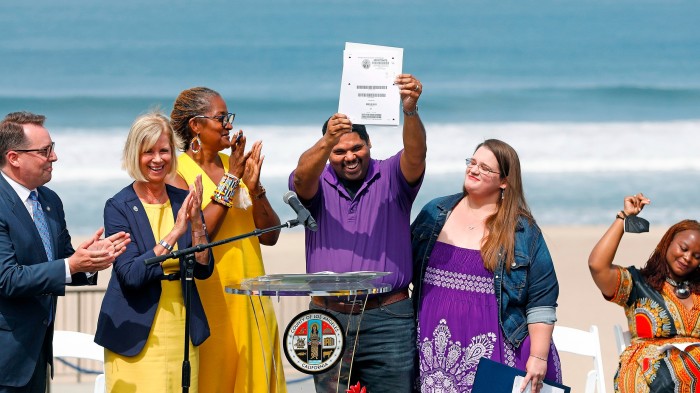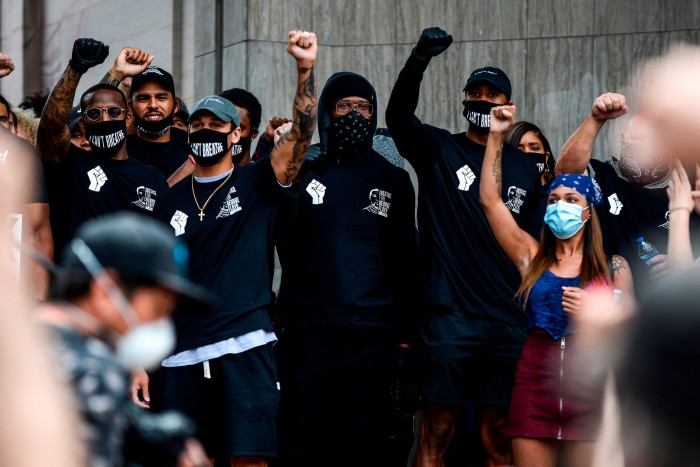Lawyers use pro bono hours to step up fight for racial justice

Roula Khalaf, Editor of the FT, selects her favourite stories in this weekly newsletter.
Big-firm lawyers are refocusing their pro bono efforts — which traditionally cover a range of issues — to address the underlying causes of racial inequities in the US since George Floyd’s murder and the rise of the Black Lives Matter (BLM) movement.
Those events led businesses across all sectors to step up their efforts to tackle racial injustice. In the legal industry, there was a new hunger to harness the culture of pro bono and community service, and to channel it into racial justice work, says Mark Fleming, a partner of WilmerHale and co-chair of its Racial Justice Reform Initiative.
Through collaboration with racial justice non-profit organisations, law firms have been able to target their efforts with a level of dedication not generally seen before.
“It really did seem to be a racial awakening,” says Michael Jones, a partner at Kirkland & Ellis. “Law firms were putting resources into examining policies that had not previously been challenged.”

Of 126 firms surveyed by the Washington DC-based Pro Bono Institute in 2021, 99 per cent said they had either maintained or increased the time lawyers spent on unpaid racial justice work compared with the year before.
In response to the BLM movement, WilmerHale lawyers focused on police retraining, voting rights and bail reform — all what Fleming calls “systemic” issues of racial injustice. They advocated for Michigan to prioritise Covid vaccinations for the incarcerated and challenged the legality of the Georgia state legislature’s voting maps on the basis that they diluted black voting strength.
WilmerHale and other law firms have also collaborated with non-profits and advocacy groups with expertise in racial justice causes, says Fleming. The firms have the resources to boost the impact these groups would have had on their own.

In 2021, Kirkland contributed $5mn to the Center for Racial Justice at Dillard University in New Orleans where Jones, who serves as a board member, is helping to brainstorm how to push for police reform without becoming mired in partisan politics. “That’s something that I don’t think would have been on my radar screen before the murder of George Floyd,” he says.
Kirkland’s contribution to Dillard was part of a $12.5mn donation it made to Historically Black Colleges and Universities (HBCUs). The funds came from the $22mn in statutory attorney fees that the firm earned by securing a $577mn settlement last year for Maryland’s HBCUs. The institutions had sued the state for historic underfunding, which had made it nearly impossible for them to remain competitive.
Meanwhile, at Sidley Austin, George Fatheree, a partner in the firm, helped execute Los Angeles County’s return of beachfront land, known as Bruce’s Beach, to the heirs of a black couple who had suffered racist harassment from white neighbours and the Ku Klux Klan. The couple had lost the property in the 1920s when the state claimed it for public use and sold it to private investors.
The case created a potential template for others to reclaim property lost due to racially unjust practices by authorities, says Fatheree, who receives calls daily from black families with related claims.
More on FT.com: Best practice case studies
Read the FT Innovative Lawyers North America ‘Best practice case studies’, which showcase the standout innovations made for and by people working in the legal sector:
His motivation to focus on real estate as a source of racial inequities comes in part from reading The Color of Law by Richard Rothstein, an emeritus senior fellow of the Thurgood Marshall Institute of the NAACP Legal Defense Fund. The book investigates how, until the last quarter of the 20th century, racially explicit policies defined where whites and African Americans should live, leaving a legacy of racial inequities that persist today. “Real estate is probably where we have some of the best evidence around the deprivation because we’ve got title records,” Fatheree points out.
In Louisiana, Dana Foster, a partner at White & Case, saw an opportunity “take concrete actions” to focus his firm’s pro bono efforts on racial injustice in the summer of 2020. He is now representing 16 mostly black defendants in the state seeking to overturn criminal convictions issued by non-unanimous, so-called “Jim Crow” juries. Segregationist Louisiana lawmakers first allowed these in the 1880s to oppress blacks, and it was only in 2020 that the US Supreme Court ruled them unconstitutional.
This ruling did not apply retroactively, though, so the men and women who are in prison because of non-unanimous juries “got screwed by this unconstitutional law”, Foster says. “They have no shot of getting these convictions thrown out unless we help them.”
For Timothy MacDonald, a partner in the Denver office of Arnold & Porter, advocating for the BLM protesters themselves was important. He helped secure a $14mn judgment for 12 protesters who were victims of police brutality in Colorado — an 18-month task, requiring 14,000-plus lawyer hours. “Our litigation made clear that there were systemic failures in the way in which the police department operated,” he says.
Many law firm leaders also recognise that a new generation of lawyers, whom they wish to retain, want their employers’ pro-bono resources to address the underlying causes of racism, rather than isolated controversies, as they had previously.
Associate candidates at Arnold & Porter see the firm “engaging in this reckoning and taking an active role” and say they want to be a part of it, notes MacDonald.
However, there are limits to what donating resources and lawyer hours to systemic changes can do. What constitutes racial justice pro bono work “continues to lack clear boundaries and consensus”, the Pro Bono Institute report states.
Although firms in the report identified working on racial justice-related policing, prison reform, and economic empowerment, for instance, only 8 per cent of respondents devoted at least 80 per cent of racial justice pro bono hours to “systemic matters” (such as legislative reform).
Ultimately, the political will of the nation dictates the limits of lawyers’ pro-bono efforts — as do the laws and what judges will enforce. “Lawyers are a critical part of any kind of durable change, but they can’t be the entirety of it, and they can’t do it alone,” says Fleming.
Comments